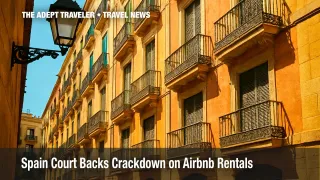Spain Court Backs Crackdown on Airbnb Rentals to Ease Housing Crisis

Planning a summer escape to Barcelona or Bilbao? A fresh Spanish court ruling has ordered web platforms to pull 66,000 illegal short-term listings, underscoring a hard truth: Airbnb rentals in Spain's hotspots are fueling a housing crunch that drives locals to the streets and tourists into headlines. The fight over scarce apartments is no longer a local quarrel; it is a global flashpoint in the overtourism debate.
Key Points
- Court blocks 66,000 non-compliant listings across Spain.
- Barcelona rents have doubled in a decade despite earlier caps.
- Why it matters: fewer long-term homes mean higher local rents.
- Anti-overtourism protests are spreading from Palma to Paris.
- Other cities, from New York to Florence, eye similar crackdowns.
Airbnb Rental Crackdown in Spain: Snapshot
Spain's ruling keeps a government order intact, forcing platforms to delist properties that lack tourist licences or breach stay limits. Catalonia alone accounts for nearly half the takedown tally. Fines can hit 400,000 euros per unit, and hosts must now display licence numbers prominently. Airbnb argues that most hosts are families supplementing income, yet analysts say more than 40 percent of listings come from multi-property landlords, reshaping entire neighborhoods.
How Short-Term Rentals Drive a Global Housing Squeeze
From Lisbon's Alfama to Venice's Dorsoduro, the logic is the same: daily tourist rates beat monthly leases, so landlords pivot. Studies in Barcelona show every 1 percent rise in Airbnb density lifts neighborhood rents by roughly 2 percent, pricing out younger residents. Similar patterns spur strikes by hospitality staff in the Canary Islands and noisy water-gun protests in Mallorca, with slogans linking rental platforms to vanishing affordable homes.
Spanish Court Ruling Fuels Worldwide Pushback on Overtourism
The Madrid Administrative Court's decision arrives amid Europe's busiest summer since 2019. By leaving the delisting order untouched, judges signaled broad support for tougher policing of vacation rentals. Municipalities now share blacklist data, and telecom filters can block URLs that re-upload banned listings. Spain joins New York, which capped stays under 30 nights without a live-in host, and Florence, which froze new licences in its UNESCO-listed center. Meanwhile, Airbnb's lobbying - citing an Oxford Economics report claiming 400,000 Spanish jobs depend on home-sharing - has found little traction with voters watching rents leap 15 percent year-on-year. Expect more lawsuits, but also more city halls arming regulators with digital tracking tools and steeper fines. For travelers, the outcome could be fewer bargain flats and a revival of small hotels and licensed guesthouses that play by local rules.
Analysis
Travelers have grown accustomed to the space and price flexibility of short-term rentals. Yet unchecked growth erodes residential stock, inflates rents, and fuels resentment that spills into strikes targeting airports, ferries, and even art museums. Spain's latest judgment signals that local well-being is edging out platform convenience. Visitors should anticipate stricter ID checks, higher nightly rates, and a pivot back toward regulated lodging. Booking early through licensed providers, such as boutique hotels or certified casas rurales, now offers not only compliance peace of mind but also a warmer reception from host communities. Monitoring city regulations - Adept Travel's strike and protest tracker is a handy start - will help travelers avoid sudden cancellations and shifting rules.
Final Thoughts
Airbnb rentals in Spain are no longer a gray-area bargain. The court-backed purge marks a decisive turn toward protecting year-round housing and preserving neighborhood character. Travelers can still enjoy authentic stays, but only by choosing licensed properties, booking in advance, and respecting resident concerns. Check local rules before you click "reserve," and pack flexibility along with your sunscreen.
